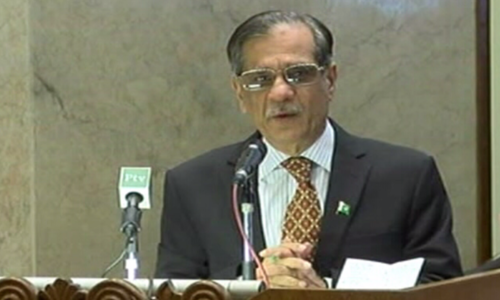ISLAMABAD: With cost escalation going beyond Rs100 billion, a Senate panel on Monday ordered two parallel investigations into unprecedented shortcomings in planning, design and execution of the Greater Karachi Water Supply Project (K-IV) that may not be able to supply water to the country’s largest city.
The Senate Standing Committee on Planning and Development was astounded to note that the original Rs15.8bn K-IV project for Karachi for which PC-1 was finalised in 2007 did not have water availability commitment, lacked 50MW power supply needed for pumping stations and the 121km water conveyance system did not provide for bridges, tunnels or other auxiliary facilities needed to flow 650 million gallon per day (MGD) water from the Keenjhar lake to Karachi.
The committee ordered the Planning Commission and the Sindh government to hold an inquiry into the matter to ascertain how the basic fundamentals were ignored for such an important project and if the scheme was a viable option, and separately referred the case to the Pakistan Engineering Council (PEC) to hold the engineers and consultants involved in the project accountable.
A meeting of the committee presided over by Senator Agha Shahzaib Durrani also expressed displeasure over similar cost escalation of the Nai Gaj dam in Sindh from Rs16bn in 2009 to over Rs46bn at present and ordered an investigation into the matter.
Senate panel also directs investigation into cost escalation of Nai Gaj dam from Rs16bn to over Rs46bn
The senators questioned the country’s planning and development capabilities, resulting in repeated cost overruns, revisions in design and other shortcomings in almost all projects.
The K-IV project director told the committee that project was to be implemented in three phases but due to delays in processing and approvals and changes in design, route and related matters, it was approved by the Executive Committee of the National Economic Council (Ecnec) in 2014 at a cost of Rs25.5bn with 50 per cent cost sharing by the federal and provincial governments.
He said there was no quota approval by the Indus River System Authority (Irsa) of 650MDG water required for the project and yet the project implementation started in June 2016 — almost nine years after the feasibility study. The federal government had already released its Rs12bn share for the project. He said the provincial government had approved a fresh augmentation project with an additional cost of Rs19bn but now ordered a complete project review by a third party to avoid mistakes made in the past.
When asked by the senators if the delays had anything to do with Bahria Town, the project director said the pipeline would pass through Bahria City and DHA City, but the project did not have any provision for water supply to these two entities because their right of way had been secured before these housing projects were launched. However, he said the two housing schemes might need to be provided with water supply from the K-IV facility in case of their higher water needs.
He said the Frontier Works Organisation (FWO) had been given the project implementation without bidding as the provincial government granted an exemption from its procurement rules. He said the FWO had quoted Rs42bn cost for the project which was not agreed to by the provincial government, but its implementation continued.
The project director said the right of way spanned over 121km from Kinjher lake to a point near northern bypass. On completion, the roads crossing K-IV right of way at various places in Thatta and Malir districts will be blocked if alternative arrangement is not made. Surprisingly, there are no roads or pedestrian bridges in the project design to accommodate crossings for settlements and staff colonies, fencing and so on.
He said 42 alterations had been made since 2014 in the project, including 22 realignments of its right of way. He said the project would require a 50MW independent power plant to meet its electricity requirement that would take 30 to 48 months or else the Hyderabad Electric Supply Company could lay a transmission line within two years to deliver its power supply.
The project director said the World Bank had shown interest in financing the project subject to compliance with its socio-economic and environmental safeguards, but formal talks on the issue were yet to begin.
The meeting was told that the Nai Gaj dam had been dropped from the agenda of Ecnec meeting in January for being a single province project with a recommendation that the Sindh government should bear the cost of the project over and above the first revision of 2012 from its own resources.
The Sindh government committed that the command area of 28,800 acres land would be developed by its agencies in synchronisation with the main dam over the project period of two years. The committee was informed that the main reason for the delay and design change was due to a consultancy error.
The Senate committee ordered constitution of a committee to investigate the matter thoroughly and determine the entity at fault along with their intentions and submit a report to it.
Deliberating on Public Sector Development Programme releases at the end of second quarter 2018-19, the committee expressed dismay over nominal PSDP releases for social sector projects, including health and education, and ordered that CPEC-related projects be not diverted to development schemes of members of the National Assembly as the PTI had been opposed to it.
The committee was told that foundation stone of the Gwadar international airport would be laid on March 28-29.
Published in Dawn, March 19th, 2019














































